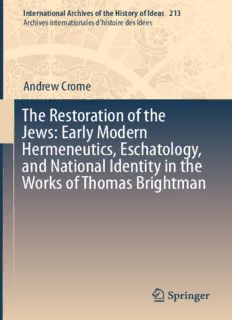
The Restoration of the Jews: Early Modern Hermeneutics, Eschatology, and National Identity in the Works of Thomas Brightman PDF
Preview The Restoration of the Jews: Early Modern Hermeneutics, Eschatology, and National Identity in the Works of Thomas Brightman
International Archives of the History of Ideas 213 Archives internationales d'histoire des idées Andrew Crome The Restoration of the Jews: Early Modern Hermeneutics, Eschatology, and National Identity in the Works of Thomas Brightman The Restoration of the Jews: Early Modern Hermeneutics, Eschatology, and National Identity in the Works of Thomas Brightman ARCHIVESINTERNATIONALESD’HISTOIREDESIDÉES INTERNATIONALARCHIVESOFTHEHISTORYOFIDEAS 213 THE RESTORATION OF THE JEWS: EARLY MODERN HERMENEUTICS, ESCHATOLOGY, AND NATIONAL IDENTITY IN THE WORKS OF THOMAS BRIGHTMAN Andrew Crome BoardofDirectors: FoundingEditors: (cid:2) (cid:2) PaulDibon andRichardH.Popkin Director: SarahHutton,UniversityofAberystwyth,Aberystwyth,UK AssociateDirector: J.C.Laursen,UniversityofCalifornia,Riverside,USA EditorialBoard:K.Vermeir,Paris;J.R.MaiaNeto,BeloHorizonte; M.J.B.Allen,LosAngeles;J.-R.Armogathe,Paris;S.Clucas,London; G.Giglioni,London;P.Harrison,Oxford;J.Henry,Edinburgh;M.Mulsow,Erfurt; G.Paganini,Vercelli;J.Popkin,Lexington;J.Robertson,Cambridge;G.A.J.Rogers,Keele; J.F.Sebastian,Bilbao;A.Thomson,Paris;Th.Verbeek,Utrecht Forfurthervolumes: http://www.springer.com/series/5640 Andrew Crome The Restoration of the Jews: Early Modern Hermeneutics, Eschatology, and National Identity in the Works of Thomas Brightman 123 AndrewCrome SchoolofArts,LanguagesandCultures UniversityofManchester Manchester,UK ISSN0066-6610 ISSN2215-0307(electronic) ISBN978-3-319-04761-4 ISBN978-3-319-04762-1(eBook) DOI10.1007/978-3-319-04762-1 SpringerChamHeidelbergNewYorkDordrechtLondon LibraryofCongressControlNumber:2014939014 ©SpringerInternationalPublishingSwitzerland2014 Thisworkissubjecttocopyright.AllrightsarereservedbythePublisher,whetherthewholeorpartof thematerialisconcerned,specificallytherightsoftranslation,reprinting,reuseofillustrations,recitation, broadcasting,reproductiononmicrofilmsorinanyotherphysicalway,andtransmissionorinformation storageandretrieval,electronicadaptation,computersoftware,orbysimilarordissimilarmethodology nowknownorhereafterdeveloped.Exemptedfromthislegalreservationarebriefexcerptsinconnection with reviews or scholarly analysis or material supplied specifically for the purpose of being entered and executed on a computer system, for exclusive use by the purchaser of the work. Duplication of this publication or parts thereof is permitted only under the provisions of the Copyright Law of the Publisher’slocation,initscurrentversion,andpermissionforusemustalwaysbeobtainedfromSpringer. PermissionsforusemaybeobtainedthroughRightsLinkattheCopyrightClearanceCenter.Violations areliabletoprosecutionundertherespectiveCopyrightLaw. Theuseofgeneraldescriptivenames,registerednames,trademarks,servicemarks,etc.inthispublication doesnotimply,evenintheabsenceofaspecificstatement,thatsuchnamesareexemptfromtherelevant protectivelawsandregulationsandthereforefreeforgeneraluse. While the advice and information in this book are believed to be true and accurate at the date of publication,neithertheauthorsnortheeditorsnorthepublishercanacceptanylegalresponsibilityfor anyerrorsoromissionsthatmaybemade.Thepublishermakesnowarranty,expressorimplied,with respecttothematerialcontainedherein. Printedonacid-freepaper SpringerispartofSpringerScience+BusinessMedia(www.springer.com) Dedicatedtothememoryofmysister, VanessaJaneCrome(1985–2002), andformyparents. Acknowledgements Itisapleasuretobeabletoacknowledgesomeofthemanywonderfulpeoplewho havehelpedandsupportedmeduringthewritingofthisbook.Thisworkisamuch expanded and revised version of my Ph.D. thesis, and with that in mind, I would liketoexpressmydeepgratitudeto Prof.GrahamWardforhissupervisionofmy work.Combiningincisivecriticismwithencouragement,hewasamodelsupervisor. ProfessorJeremyGregory’sencouragementafterservingasexternalexaminer,and laterasacolleague,isalsogratefullyrecalled. Iwasabletoconductadditionalresearchandsubsequentlyexpandandrevisemy thesis, due to a veryenjoyable1-yearlectureshipat the Universityof Manchester. The book was fully revised at the start of a Postdoctoral Fellowship at Trinity College Dublin, generously funded by the Irish Research Council for Humanities and Social Sciences (IRCHSS). I would like to thank all of my colleagues in Manchester and Dublin for creating congenial and friendly working atmospheres and the IRCHSS for their support and funding. Now that I have returned to the UniversityofManchester,Iamgratefultomycolleaguesandstudentsformakingit suchawonderfulplacetowork. Intermsofthisbook,IamindebtedtolibrariansattheBritishLibrary,University of Edinburgh, John Rylands Library Manchester, and the National Library of Scotland for their help. Crawford Gribben read an earlier draft of this manuscript andofferedadviceand encouragement.The commentsof two anonymousreaders forSpringerwereextremelyencouragingandhelpfulandpointedoutareaswhich neededreworking.Theyhaveallhelpedmetoavoidsomeembarrassingmistakes. Needlesstosay,anyremainingerrorsareentirelymyown.MythanksalsotoAnita vanderLinden-RachmatatSpringerforhereditorialguidance.Iamalso thankful forthepatienceoftheLayReaderwhobumpedintomeatHawnesChurch,where I turned up in 2009 clutching a picture of Thomas Brightman like some sort of obsessedfan.Shewasverykindinshowingmethebuilding,andevenapologising for areas that Brightman would not approveof (an unnecessary gesture given the beautyofthechurch). Somepartsofthisbookhaveappearedinless-developedformselsewhere.Earlier elements of Chaps. 5 and 6 appeared in ‘“The Proper and Naturall Meaning of vii viii Acknowledgements theProphets”:TheHermeneuticRootsofJudeo-centricEschatology’,Renaissance Studies 24:5 (2010), pp. 725–741. I am grateful to Wiley-Blackwell and current editor Jennifer Richards for permission to reuse them here. Parts of the final section of Chap. 7 appeared as “Friendship and Enmity to God and Nation: The ComplexitiesofJewish-GentileRelationsintheWhitehallConferenceof1655”in Friendship in the Middle Ages and Early Modern Age, eds Albrecht Classen and Marilyn Sandidge (Berlin: de Gruyter Press, 2011), pp. 749–777. I would like to thankdeGruyterandtheeditorsfortheirpermissiontoreusetheminthisbook. Finally,onapersonalnote,Iwouldliketothankallofthosefriendsandfamily members who have supported me outside of the academy. In Manchester, Sam Carey,JonAinscough,DanRozday,TimWickham,StefEsltub,AnnaGreen,Helen Hardwick, Alison Pimblott, Lizzie Slingsby, Dave Woodbridge, Jason Whitt and Sonke Enkelgen deserve special mention. In Dublin, special thanks to all of the membersof“EarlyModernTavernSoc”,aswellasTimandClareRoulson,Adam Fleming,IanandJenniferHornerandPaddyGriffin,allofwhomgaveme a great welcome to Irish life. There are countless others I have forgotten to mention and Ioffermyapologiesifthecurrentreaderisamongstthem. Myfinalthanksmustgotomyparents,whosupportedmebothemotionallyand financially throughoutmy Ph.D. and have constantly encouragedmy work. I owe themmorethanIcansay–andIhopethatthisbookengagesthem(andallreaders) withthewonderfulworldofearlymoderneschatology. Contents 1 Introduction .................................................................. 1 1.1 ReturningtothePuritanApocalypse................................... 9 1.2 ThomasBrightman...................................................... 13 1.3 Brightman:ABriefBiography......................................... 16 References..................................................................... 24 2 HermeneuticsandtheJewsinProtestantThought ...................... 29 2.1 TheLiteralandAllegoricalSensesofScripture....................... 30 2.2 Hermeneutics,EschatologyandtheJewsintheMiddleAges........ 36 2.3 HermeneuticsandtheBookofRevelationintheReformation....... 39 2.4 Hermeneutics,EschatologyandtheJewsinEarly ModernEngland ........................................................ 42 References..................................................................... 55 3 Historicising Allegory: Thomas Brightman andtheHistoricisingCommentary ........................................ 59 3.1 RecastingtheHistoricalSense ......................................... 60 3.2 The Seven Letters to the Churches: Dealing withHistoricalTension................................................. 69 3.3 TheMillenniumandtheOpeningofHistory.......................... 76 3.4 HistoricisingAllegory:TheSongofSongs andtheJewishPromises................................................ 81 References..................................................................... 93 4 ConsistentLiteralismandtheRestorationoftheJews.................. 97 4.1 TheRoleoftheJews.................................................... 98 4.2 TheJewishPromises:“Consistent”Literalism........................ 107 4.3 TheRe-createdSelf:Emphasising“Englishness”..................... 118 References..................................................................... 127 5 ThomasBrightmanandJudeo-Centrism1610–1640.................... 131 5.1 SeparatistReadingsofBrightman...................................... 132 5.2 TheEarlyReceptionofBrightman’sWork............................ 137 ix
Description: